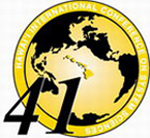CTG continues to provide leadership at Hawaii International Conference on System Sciences (HICCS)
 The annual HICSS conference is a unique and respected forum in computer and information systems and technology for the exchange of ideas among research and development communities around the world. It is one of the oldest and most influential conferences in the field of system sciences. CTG has played a key leadership role in establishing both the size and stature of the Electronic Government track. This year, CTG staff co-chaired three of the e-Government mini-tracks, helped to facilitate a day-long symposium on a Global Electronic Government Research and Practice Community, and presented two papers.
The annual HICSS conference is a unique and respected forum in computer and information systems and technology for the exchange of ideas among research and development communities around the world. It is one of the oldest and most influential conferences in the field of system sciences. CTG has played a key leadership role in establishing both the size and stature of the Electronic Government track. This year, CTG staff co-chaired three of the e-Government mini-tracks, helped to facilitate a day-long symposium on a Global Electronic Government Research and Practice Community, and presented two papers.
Over the past several years, the emergent study domain of e-Government, also referred to as digital government, has produced a rapidly increasing number of research contributions at HICSS and other leading conferences and journals around the world. The HICSS e-Government track has grown from one mini-track in 2001 with six papers to eight mini-tracks in 2008 with thirty-five papers.
At HICSS41, the e-Government Track included E-Government Emerging Topics; E-Democracy; E-Government Information Security; E-Government Architecture, Infrastructure, and Interoperability; E-Government Organization and Management; E-Government Services and Information; E-Policy, Law, and Governance; and Mobile Services and Technologies in Government.
The success of the e-government track reflects the efforts of an international team led by Jochen Scholl, of the Information School at the University of Washington, whose leadership at HICSS began when he was a graduate assistant at CTG. CTG leaders Anthony Cresswell, Theresa Pardo, and Sharon Dawes, have all co-chaired e-Gov mini-tracks and numerous papers based on CTG research have been presented at the conference.
At HICCS41, Anthony Cresswell co-chaired the E-Government Organization and Management mini-track, which addressed organizational and methodological frameworks as well as managerial aspects of e-Government. Theresa Pardo co-chaired the E-Government Emerging Topics mini-track, which provided a place for new topics and trends that may have the potential to become a subfield in their own right. Sharon Dawes co-chaired E-Policy, Law, and Governance, which focused on how the development, utilization, and expansion of information and communications technologies (ICT) are interrelated with creation and implementation of public policies and laws as well as how these technologies impact and influence governance systems.
In addition, Theresa helped to facilitate the 2nd Annual Symposium of the Global Electronic Government Research and Practice Community. The other committee members for the symposium included Valerie Gregg (Lead), Tomasz Janowski, Marijn Janssen, Jochen Scholl, and Maria Wimmer. The purpose of this full-day symposium was to engage the community of international e-Government/Digital Government scholars in an exchange of mutually interesting research topics. The symposium opened with groundbreaking papers in e-Government research published in 2007. Later, Sharon participated on a panel with Lawrence E. Brandt, US National Science Foundation and Tomasz Jankowski, UN University, Macau on What Constitutes Excellence in Digital/E Government Research or Defining Our Domain Ten Years Later. The panel was chaired by the Digital Government Society of North America president, Eduard Hovy, USC. The symposium complemented the paper sessions of the HICSS e-Government Track.
In the paper sessions, Theresa presented a paper co-authored by J. Ramon Gil-Garcia and G. Brian Burke, Governance Structures in Cross-Boundary Information Sharing: Lessons from State and Local Criminal Justice Initiatives and Sharon presented a paper, An Exploratory Framework for Future E-Government Research Investments.